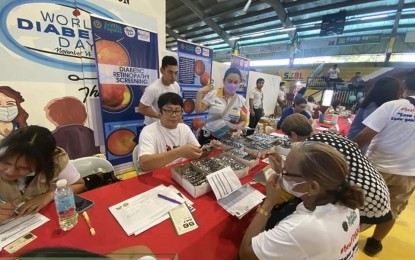
MEDICAL MISSION. The Department of Health Ilocos Region holds a medical mission in San Juan, La Union for the World Diabetes Day celebration last Tuesday (Nov.14, 2023). It conducted health risk assessment including risk history, basic blood chemistry, and urinalysis as well as medical consultation, retinopathy screening and vision screening, dental services, health education, and nutrition and diet counseling. (Photo courtesy of DOH-CHD-1)
MALASIQUI, Pangasinan – The Department of Health-Center for Health Development in the Ilocos Region (DOH-CHD-1) regularly conducts free mobile diabetic screening tests and promotes healthy lifestyle as part of the interventions to curb the rising diabetes cases in the region.
In a phone interview on Thursday, DOH-CHD-1 diabetes program manager Erwin Baclig Jr. said they are recommending two and half hours per week of moderate to intense exercise or 20 minutes a day exercise as among the measures to maintaining a healthy lifestyle and prevent diabetes.
“Physical activity prevents obesity. Obesity causes many diseases like cardiovascular diseases and blocks the absorption of insulin. Physical activity helps us to perspire to release toxins in the body and helps in the production of hormones that we need,” he said.
Baclig also warned the public against prolonged sitting.
“As they say, sitting for prolonged periods is the new smoking. Its danger to health is now the same as smoking,” he said.
The major common risk factors in developing non-communicable diseases like diabetes are physical inactivity, unhealthy diet, smoking, and harmful use of alcohol, he said.
Baclig said diabetic patients may avail of services at the Rural Health Units in their respective localities while the DOH-CHD-1 conducts health services missions all over the region.
In a statement on Wednesday, DOH-CHD-1 director Paula Paz Sydiongco said healthcare access for diabetes patients is one of their priorities, hence. the mobile diabetic screening tests in municipalities.
“Kasama na dito ang pamimigay ng libreng maintenance medicines at regular consultations upang hindi na sila mahirapan pang pumunta sa hospital. Kami na ang nagdadala ng mga kailangan nilang serbisyo upang sila ay hindi mapabayaan (Along with it is the distribution of free maintenance medicines and regular consultations so they would not have to go to the hospitals. We bring to them the needed medical services so that they would not be taken for granted),” she said.
Sydiongco said DOH, along with its partner agencies and stakeholders, conducts regular diabetes education, nutrition consultations, diabetes testing and monitoring, and diet and weight management to ensure that patients have access to proper information.
A total of 7,174 new diabetic patients were added last year in the region based on the 2022 Field Health Services Information System (FHSIS) report.
Of the total, 323 are from Ilocos Norte, 902 from Ilocos Sur, 1,425 from La Union, 3,931 from Pangasinan, and 593 from Dagupan City.
Ilocos Region has a total of 115,112 diabetes cases recorded from 2016-2022. (PNA)
